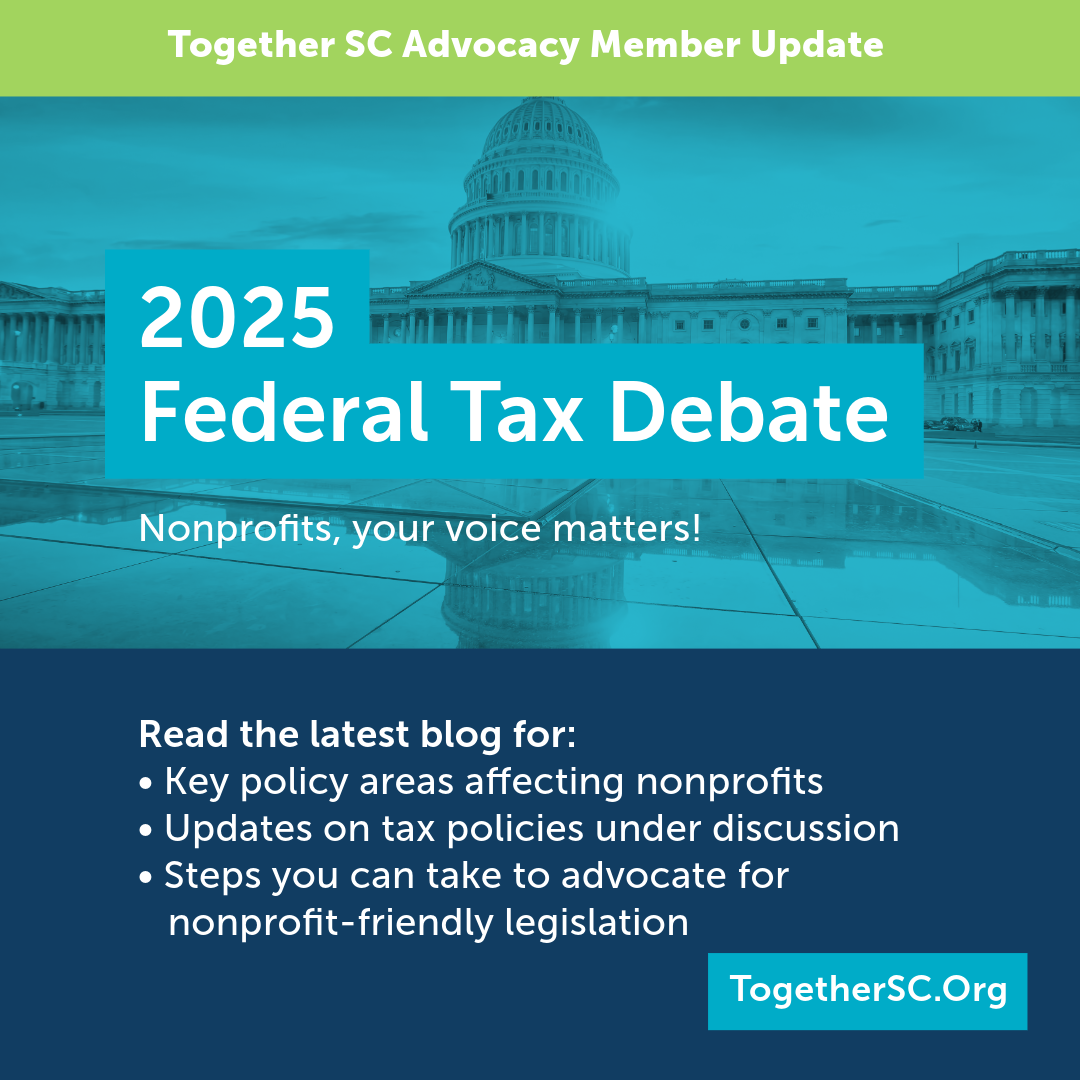A Primer on the 2025 Federal Tax Debate
 The 2017 Tax Cut & Jobs Act (TCJA), commonly called "Trump Tax Cuts" expire at the end of 2025. The debate on renewal of these tax proposals will take place in the Winter & Spring of 2025 as the House and Senate (both with Republican majorities) look to renew, adjust, and add to the package, with a goal of giving President-Elect Donald Trump a significant policy victory early in his term.
The 2017 Tax Cut & Jobs Act (TCJA), commonly called "Trump Tax Cuts" expire at the end of 2025. The debate on renewal of these tax proposals will take place in the Winter & Spring of 2025 as the House and Senate (both with Republican majorities) look to renew, adjust, and add to the package, with a goal of giving President-Elect Donald Trump a significant policy victory early in his term.
Nonprofit Angle: The tax code includes all elements that impact the core corporate structure of nonprofits (501c3), as well as charitable deductions, employer tax laws, and more.
Nonprofits need to be ready to act quickly as this debate takes shape to help advance nonprofit-friendly tax policies.
What We're Watching: In particular, Together SC will encourage all nonprofits to help advocate on the following policy areas, as highlighted by the National Council of Nonprofits:
-
Charitable Nonprofits in Law, Fact, and Purpose (Johnson Amendment)
-
Additional policies may be added as the debate takes shape.
As the debate unfolds, we will keep you updated on our website and in our member communications.
Pro-Tip: Join the Advocacy Allies Peer Network for special in-depth / more frequent updates, and join the Network's ListServ to connect with other advocacy peers and receive quick updates direct to your inbox!
TAKE ACTION NOW!
You don't have to wait for the debate to begin though. Join Together SC and sign on to this letter from our friends at the National Council of Nonprofits to encourage Congress to take note of these nonprofit priorities and include them in any proposals that emerge!
State of Play
January 17 Update:
This morning the Republicans on the House Budget Committee released a "Menu" of items that they are putting on the table to be considered for expansion/reduction/adjustment in the tax debate.
From the National Council of Nonprofits:
This morning the House Budget Committee Republicans released a 50-page “reconciliation menu” of spending cuts to pay for the upcoming reconciliation bill and identified certain 2017 tax cuts to be extended or broadened under the bill.
Nonprofit-specific provisions include, among others: targeting education endowments, removing hospital tax-exempt status, eliminating the Employee Retention Tax Credit, changing Public Service Loan Forgiveness Program eligibility, and reforming federal benefits. Proposals would also apply work requirements to Supplemental Nutrition Assistance Program (SNAP, commonly referred to as food stamps) and Temporary Assistance for Needy Families (TANF) benefits. The proposals would reduce the corporate tax rate from 21% to 20% or 15% at estimated costs between $73B to $522B.
January 16 Update:
This debate will happen fast, and alongside many other complex policy discussions. It's important to understand this busy and complex backdrop as the process and calendar will have an impact on how tax policy is shaped.
Top of mind is the legislative vehicle that will be used to enact tax policy changes - Budget Reconciliation.
The Budget Reconciliation process, in a very short summary, allows Congress to attach policies that impact revenue (increase/decrease) to what amounts to a budget amendment, and (this is important) do so with a simple majority - avoiding a filibuster and 60-vote threshold on the Senate side. Here's a primer on the process if you want to learn more.
Senate rules dictate this process more so than House, but to pass the Senate, the House will have to adhere to Senate rules on reconciliation, particularly the "Byrd Rule".
One Big Bill. In early January, President-Elect Trump backed a strategy of pushing through only one Reconciliation package (preferred by Speaker of the House) instead of two (preferred by Senate Majority Leader). This means that Taxes, Immigration, and Energy reform are all going to be in one big bill.
No Margin. House Republicans have the slimmest of slim majorities. Assuming no one is absent for votes, Speaker Mike Johnson (R-LA) is left with a near-zero vote margin for the Republicans to win by simple majority. Until now-former Rep. Matt Gaetz (R-FL) seat is filled, there are 219 Republicans and 215 Democrats. One vote sway means a 218-216 victory, two votes is a 217-217 tie, which loses. Democrats are likely to unilaterally vote against this package, so the Speaker will need every Republican. This won't be easy on the House side.
Dive Deeper: Here's a look at some of the complicated Senate rules related to Reconciliation and how the Senate may still break this up into multiple packages, but with a lot of asterisks.
Due Date: Oh, and the target for this package to be signed into law, as announced by Speaker Johnson this week (January 16) is before Easter (April 20).
Now, to be fair deadlines are important because they create pressure, but they can be moved. There is no hard deadline on this process other than the political desire to achieve some of the largest priorities of the new administration in the first 100 days. "When it comes to Congress, always take the over."
Keep in Mind. You may remember the 2024 government funding debate that stretched into December. In lieu of a full budget deal, or a long-term Continuing Resolution, Congress opted for a 90-day CR, stretching government funding at level amounts through March 14, 2025.
So, amidst the tax debate / budget reconciliation debate - Congress will also have to dispense with government funding, again.
One other factor has been the Debt Ceiling - the amount Congress authorizes the US to borrow. Originally proposed to be part of the Reconciliation package, it now appears the Debt Ceiling will be tied to government funding - with a recommendation of extending it well into the second term of Donald Trump's presidency.
These two issues are ones where the Speaker may need Democrats for passage, which - for purposes of our tax debate - sets up some interesting political dynamics inside the majority party as the tax debate will be going on at the same time.
These will take up time, oxygen, and political capital - so they're important to keep in mind. There is no clear path yet on these two yet, but stay tuned.

